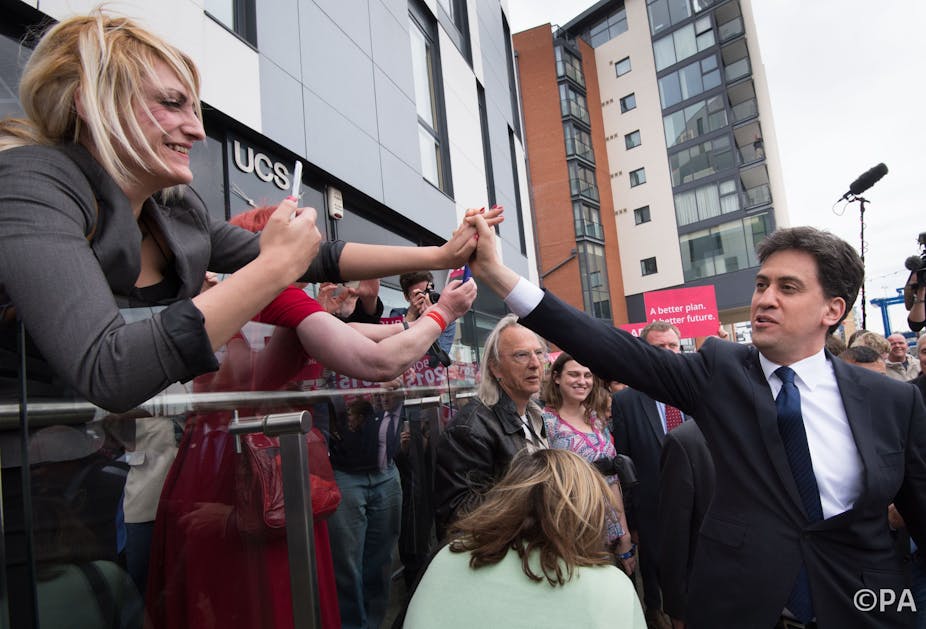Of course when I want to know about politics I ask my 16-year old daughter. Teenage girls have generated a bit of a twitterstorm over #Milifandom. Apparently he’s cool, he does “banter” and he can “connect” with young people.
Judging by the twitter activity, vines, memes and associated social media exchanges, this has become an entertaining antidote to what is currently a rather turgid campaign.
Sadly for Ed this legion of new supporters are too young to vote on May 7. But is something going on here? Has Ed’s stock risen? Has the leader as liability now become the leader as asset? Here are three possible explanations for the sudden Miliband surge.
Low expectations
We should remember that Miliband started this campaign from a particularly low base. In June 2014 he was polling so badly Jeremy Paxman memorably claimed “he hasn’t much more appeal than a flatulent dog in a lift”.
In Yougov polling 59% of voters saw him as weak and only 20% thought he was up to the job of Prime Minister. His poor performance at the party conference in Manchester later in the year did not improve matters and mutterings over replacing him surfaced as recently as last November. However, as Tim Bale points out Miliband is facing an opponent in David Cameron who also polls poorly and has his own problems.
Low politics
The Tories may have underestimated Miliband. Week after week at Prime Ministers Questions, David Cameron would attack Miliband as “weak”. Attacks have recently shifted to presenting him as “dangerous” for being willing to do a deal with the SNP. Much of this has been counterproductive.
Labour’s tactic has been to avoid the personal stuff. With Miliband’s increased exposure, the electorate see not a weak or dangerous leader, but a fresher, more dynamic candidate.
Even the Daily Mail’s hatchet job, exposing Miliband as a philanderer seemed to backfire having the opposite effect.
Miliband now poses for selfies with hen parties, chats and engages. Cameron by contrast looks tired and unenthusiastic, cocooned behind protective cordons to avoid meeting any real voters. Image, as spin doctors obsess, matters in a campaign that is increasingly visually-driven
Desperate to humanise politicians, campaign teams strive for positive leadership imagery and the elusive authenticity. Miliband is slowly gaining an image where none existed before and the public quite like an underdog.
Low exposure
The greater exposure has benefited Miliband. He survived the televised debates and his conversational style actually worked well in parts. Again, with low expectations he surprised many.
Seeing him as prime ministerial is not such a leap of faith as it was at the start of the campaign. The power of human agency may not be as strong as the media make us believe, but perceptions can be shaped in an election campaign.
Nick Clegg’s performance in the televised debates in 2010 launched a brief moment of Cleggmania. But this dissipated as the Liberal Democrats gained much greater scrutiny as a result. Clegg had gained familiarity though and while the bounce stubbornly refused to turn into seats in 2010, his personal ratings gave him a level of political capital that boosted him in coalition negotiations and helped him to become Deputy Prime Minister.
Miliband’s performance and a folksy style on the campaign trail may have similarly altered perceptions to boost his personal capital.
A note of caution
Miliband’s personal ratings have certainly shifted on to an upward curve. While both Cameron and Miliband remain in negative approval territory, Miliband is now less unpopular than he was and has closed the gap with Cameron across all polling.
Miliband scores well on likeability and has undoubtedly gained momentum. But all this is from a very low base and general disaffection with the current crop of (male) party leaders.
Even Rob Ford, the crack-smoking Mayor of Toronto, had higher approval ratings in 2013 than both leaders do now.
The Labour Party is competing for votes in a multiparty arena where each other party can limit potential seat gains. Miliband’s bounce is at least shoring up parts of the core Labour vote as he appears a more credible party leader (a few MPs may regret not having Miliband on their election leaflets after all).
It seems that Miliband, evidently not quite the liability as first assumed, is in the game, exhibiting that rare commodity “bouncebackability”.
Whisper it softly: hell yeah … he may even be turning young people on to politics.

